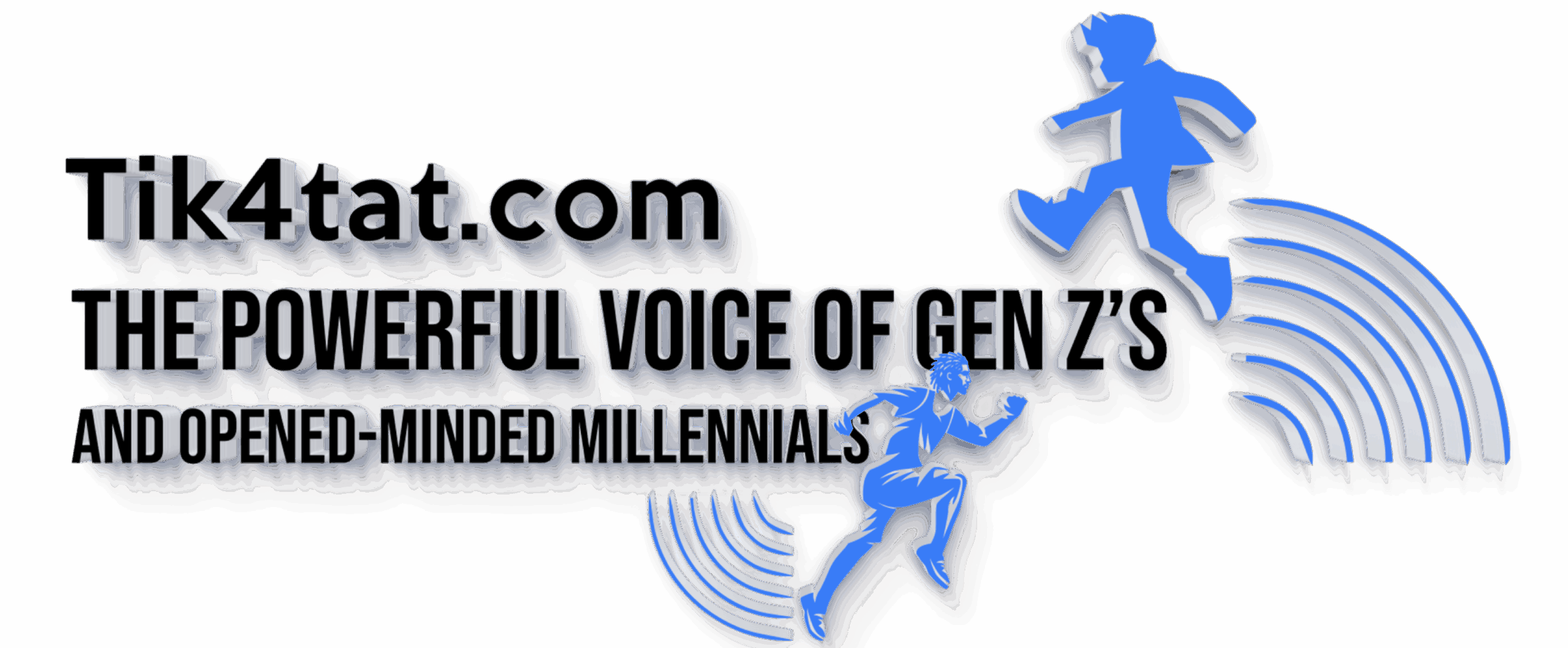- Go to shop
No products in the cart.
The Ascent of a New Era: Gen Z and Millennials Forging Power in Key Sector: TiK4tat.com
- Gen Z's and Millennials
- The Ascent of a New Era: Gen Z and Millennials Forging Power in Key Sector: TiK4tat.com

 The traditional landscape of power is undergoing a seismic shift, driven by the dynamism and distinct perspectives of Generation Z and Millennials. These cohorts, digital natives with a strong sense of social consciousness and a desire for innovation, are not just the leaders of tomorrow – they are increasingly wielding significant influence today across politics, sports, medicine, and business. Their fresh approaches, technological fluency, and commitment to change are reshaping these vital sectors in profound ways.
The traditional landscape of power is undergoing a seismic shift, driven by the dynamism and distinct perspectives of Generation Z and Millennials. These cohorts, digital natives with a strong sense of social consciousness and a desire for innovation, are not just the leaders of tomorrow – they are increasingly wielding significant influence today across politics, sports, medicine, and business. Their fresh approaches, technological fluency, and commitment to change are reshaping these vital sectors in profound ways.
Politics: Disrupting the Status Quo
The political arena, often perceived as resistant to rapid change, is witnessing a growing influx of Gen Z and Millennial leaders who are challenging established norms and bringing new energy to governance. Having come of age during periods of significant social and economic upheaval, including the 2008 financial crisis, the rise of social media, and increasing awareness of climate change and social justice issues, these generations possess a unique set of priorities and a distinct approach to political engagement.
Millennials, now in their late twenties to early forties, are moving beyond activism and into positions of real political power. Many who cut their teeth in grassroots movements and local politics are now ascending to state and national levels. They are often characterized by their pragmatic approach, their focus on issues like economic inequality, healthcare access, and climate action, and their adept use of digital platforms for communication and mobilization.
Millennial Political Leaders:
- U.S. Representatives like Alexandria Ocasio-Cortez: A prominent voice on progressive issues, she leverages social media to directly engage with constituents and shape national conversations.
- State Governors like Jared Polis (Colorado): A tech entrepreneur turned politician, he embodies a blend of business acumen and progressive social policies.
- Canadian Prime Minister Justin Trudeau: While at the older end of the Millennial spectrum, his early embrace of digital communication and progressive stances resonated strongly with younger voters.
Generation Z, the oldest of whom are now in their late twenties, are just beginning to flex their political muscle, but their impact is already being felt. Having grown up in an even more digitally saturated and socially aware environment, they are highly engaged on issues of climate justice, racial equity, and LGBTQ+ rights. Their activism, often amplified through platforms like TikTok and Instagram, translates into a potent force for political change, and increasingly, into electoral success.
Emerging Gen Z Political Figures:
- Sarah McBride (Delaware State Senator): As the first openly transgender state senator in U.S. history, she represents a new wave of inclusive and representative leadership.
- Maxwell Frost (U.S. Representative): The first Gen Z member of Congress, his youth and passionate advocacy for gun violence prevention resonate with a generation deeply affected by such issues.
- Young activists like Greta Thunberg: While not holding formal political office, her global advocacy on climate change has undeniably shaped political discourse and policy.
These younger leaders are not just advocating for different policies; they are also changing the way politics is conducted. They prioritize transparency, direct communication with constituents through social media, and a more collaborative and inclusive approach to governance. Their willingness to challenge established hierarchies and their comfort with digital tools are forcing older generations of politicians to adapt and engage in new ways. As their numbers in elected office continue to grow, Gen Z and Millennials are poised to reshape the political landscape, making it more responsive to the needs and values of a rapidly evolving society.
Sports: Beyond the Game
The world of sports, traditionally dominated by on-field achievements, is increasingly influenced by the values and expectations of Gen Z and Millennial athletes and fans. These generations are not just passive consumers of sports; they are active participants in shaping its culture, demanding greater social responsibility from athletes and organizations, and consuming content in entirely new ways.
Millennial athletes have already begun to leverage their platforms to advocate for social and political causes. Figures like LeBron James, Megan Rapinoe, and Colin Kaepernick have demonstrated a willingness to speak out on issues ranging from racial injustice to gender equality, often at personal and professional risk. This activism resonates strongly with younger fans who value authenticity and social consciousness in their sporting heroes.
Influential Millennial Athletes:
- LeBron James: Beyond his basketball prowess, he has become a significant voice on social justice issues and uses his platform to promote civic engagement.
- Megan Rapinoe: A vocal advocate for gender equality and LGBTQ+ rights, her activism has transcended the sport of soccer.
- Lewis Hamilton: A Formula 1 champion who actively campaigns for environmental sustainability and diversity within motorsport.
Gen Z athletes are following in these footsteps, often with an even greater expectation that their values will be reflected in the sports they play and support. They are more likely to engage with sports through social media, highlight reels, and individual athlete content rather than traditional broadcast models. They also place a high value on diversity, equity, and inclusion within sports, and are more likely to support athletes and teams that champion these values.
Emerging Gen Z Athletes:
- Coco Gauff: A young tennis star who has used her platform to speak out on social justice issues and advocate for change.
- Ja Morant: A dynamic basketball player with a strong social media presence, connecting directly with fans in new ways.
- Emma Raducanu: A tennis sensation who embodies a new generation of global and digitally savvy athletes.
Furthermore, Gen Z and Millennials are driving the growth of esports and digital gaming as legitimate forms of competition and entertainment. Their engagement with these platforms is reshaping the definition of “sports” and creating new opportunities for athletes, content creators, and brands. The traditional sports landscape is being forced to adapt to these changing consumption habits and the demand for more authentic and socially conscious engagement. Leagues and organizations are increasingly leveraging social media influencers and creating digital content tailored to younger audiences to remain relevant in this evolving environment.
Medicine: A Patient-Centric Revolution
The healthcare sector, facing unprecedented challenges and opportunities, is being significantly impacted by the expectations and approaches of Gen Z and Millennial patients and practitioners. These generations, raised with readily available information and a focus on personalized experiences, are demanding a more transparent, accessible, and patient-centric healthcare system.
Millennial doctors and healthcare professionals are entering the workforce with a different perspective on work-life balance, technology integration, and patient communication. They are more likely to embrace digital tools for diagnosis, treatment, and patient engagement, and they often prioritize a collaborative and empathetic approach to care.
Our example of Millennial Leaders in Medicine:
- Physicians who are early adopters of telehealth and digital health platforms: They are leveraging technology to improve patient access and convenience.
- Researchers focused on personalized medicine and data-driven healthcare: They are utilizing technological advancements to tailor treatments to individual patient needs.
- Healthcare administrators advocating for greater transparency and patient involvement in decision-making:They are working to create a more equitable and responsive healthcare system.
Gen Z patients are even more digitally native and expect seamless, on-demand access to healthcare information and services. They are more likely to research their conditions online, seek virtual consultations, and utilize wearable technology to monitor their health. They also place a high value on mental health and holistic wellness, pushing for a more integrated approach to healthcare that addresses both physical and mental well-being.
Gen Z’s Influence on Healthcare:
- Increased demand for mental health services and destigmatization of mental health issues: They are more open to seeking therapy and advocating for mental health support.
- Growing interest in alternative and complementary therapies: They are exploring a wider range of approaches to health and wellness, including mindfulness and nutrition.
- Preference for digital communication with healthcare providers: They expect to be able to book appointments, request prescription refills, and receive test results online or via mobile apps.
The healthcare industry is responding to these generational shifts by investing in digital health solutions, expanding telehealth services, and focusing on improving patient experience. The emphasis is shifting towards preventative care, mental wellness, and personalized treatment plans, driven by the demands and values of Gen Z and Millennial patients and the innovative approaches of younger healthcare professionals.
Business: Innovation with Purpose
The business world is undergoing a significant transformation, fueled by the entrepreneurial spirit, technological fluency, and social consciousness of Gen Z and Millennials. These generations are not just seeking jobs; they are creating them, disrupting traditional industries, and demanding that businesses operate with a greater sense of purpose.
Millennial entrepreneurs have already made a significant impact, founding companies that prioritize innovation, sustainability, and social impact. They are often characterized by their collaborative leadership styles, their embrace of remote work and flexible schedules, and their focus on creating a positive company culture.
TiK4tat example of Millennial Business Leaders:
- Founders of tech startups focused on solving social or environmental problems: They are leveraging technology to address pressing global challenges.
- Leaders in the gig economy and creator economy: They are building new models of work and empowering individual entrepreneurship.
- Executives championing diversity, equity, and inclusion within their organizations: They are working to create more equitable and representative workplaces.
Gen Z is following suit, bringing an even greater emphasis on digital-first strategies, authenticity, and purpose-driven work. They are highly adept at leveraging social media for marketing and building communities, and they often prioritize companies that align with their values on issues like sustainability and ethical sourcing. Many Gen Z individuals are also embracing side hustles and entrepreneurial ventures from a young age, demonstrating a strong drive for independence and innovation.
Gen Z’s Impact on Business:
- The rise of social media influencers and content creators as entrepreneurs: They are building businesses around their online presence and expertise.
- Increased demand for sustainable and ethically produced goods and services: They are holding businesses accountable for their environmental and social impact.
- The growth of direct-to-consumer brands that prioritize transparency and community engagement: They are challenging traditional retail models and building direct relationships with consumers.
Businesses are recognizing the need to adapt to the values and expectations of these younger generations, both as employees and consumers. This includes embracing remote work, prioritizing diversity and inclusion, focusing on sustainability, and engaging authentically on social media. The future of business is increasingly being shaped by the innovative ideas, technological fluency, and commitment to purpose that define Gen Z and Millennial leaders.
Conclusion: A Generational Fusion of Power
Generation Z and Millennials are no longer just the future; they are the present drivers of change across politics, sports, medicine, and business. Their unique perspectives, shaped by a rapidly evolving world and amplified by digital technologies, are challenging established norms and forging new paths. While each sector presents its own specific dynamics, the overarching trend is clear: these generations are demanding greater transparency, authenticity, social responsibility, and innovation. As they continue to rise in influence, their impact will only intensify, leading to a more dynamic, inclusive, and purpose-driven future for these critical sectors. The fusion of their energy, values, and technological prowess is ushering in a new era of power, one that promises to reshape the world in profound and lasting ways.


